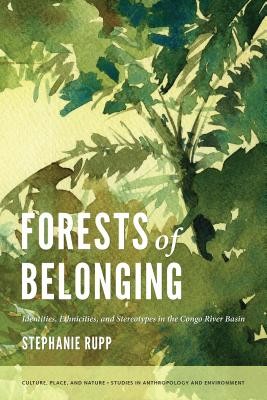
- We will send in 10–14 business days.
- Author: Stephanie Karin Rupp
- Publisher: University of Washington Press
- Year: 2011
- Pages: 304
- ISBN-10: 0295991062
- ISBN-13: 9780295991061
- Format: 15.2 x 22.6 x 2.5 cm, softcover
- Language: English
- SAVE -10% with code: EXTRA
Reviews
Description
Forests of Belonging examines the history and ongoing transformation of ethnic and social relationships among four distinct communities--Bangando, Baka, Bakwéle, and Mbomam--in the Lobéké forest region of southeastern Cameroon. By slotting forest communities into ecological categories such as "hunters" and "gatherers," previous analyses of social relationships in tropical forests have resulted in binary frameworks that render real-life relationships invisible and that have perpetuated correspondingly misleading labels, such as "pygmy." Through rich descriptive detail resulting from field work among the Bangando, Stephanie Rupp illustrates the complexity of social ties among groups and individuals, and their connections with the natural world. She demonstrates that social and ethno-ecological relations in equatorial African forests are nuanced, contested, and shifting, and that the intricacy of these links must be considered in the design and implementation of aid policies and strategies for conservation and development.
EXTRA 10 % discount with code: EXTRA
The promotion ends in 18d.08:59:15
The discount code is valid when purchasing from 10 €. Discounts do not stack.
- Author: Stephanie Karin Rupp
- Publisher: University of Washington Press
- Year: 2011
- Pages: 304
- ISBN-10: 0295991062
- ISBN-13: 9780295991061
- Format: 15.2 x 22.6 x 2.5 cm, softcover
- Language: English English
Forests of Belonging examines the history and ongoing transformation of ethnic and social relationships among four distinct communities--Bangando, Baka, Bakwéle, and Mbomam--in the Lobéké forest region of southeastern Cameroon. By slotting forest communities into ecological categories such as "hunters" and "gatherers," previous analyses of social relationships in tropical forests have resulted in binary frameworks that render real-life relationships invisible and that have perpetuated correspondingly misleading labels, such as "pygmy." Through rich descriptive detail resulting from field work among the Bangando, Stephanie Rupp illustrates the complexity of social ties among groups and individuals, and their connections with the natural world. She demonstrates that social and ethno-ecological relations in equatorial African forests are nuanced, contested, and shifting, and that the intricacy of these links must be considered in the design and implementation of aid policies and strategies for conservation and development.


Reviews